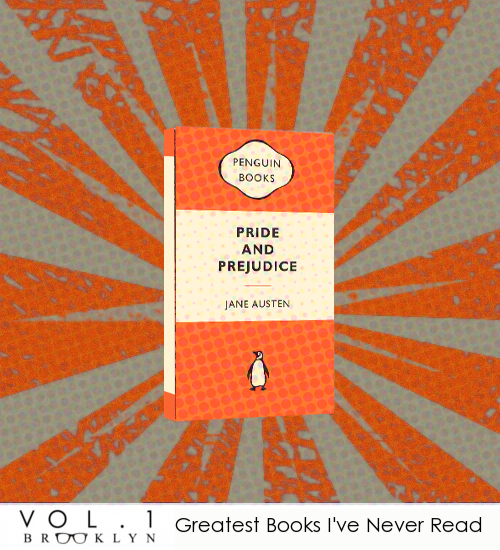In each volume of his bound-to-be-award-winning series “The Greatest Books I’ve Never Read”, avid procrastinator and V1’s Nick Curley profiles a renowned tome of fiction that, for a variety of reasons, he has not gotten around to completing during his tenure on this earth. In other words: an almost entirely uninformed book review. This series aims to be confessional, cathartic, and as embarrassing as possible. It is an inquiry into non-reading where reading should have been: a descent into the illiterate soul. Join him in our shared, faux-bookish plight: we are in this together, and he is dying for your sins.
THIS WEEK’S ADVENTURE: Pride and Prejudice by Jane Austen (T. Egerton Whitehall, 1813)
SYNOPSIS OF PRESUMED EXCELLENCE: One of the most popular novels of the English language, Pride and Prejudice is a work of art that only we ninjas of ignorance have managed to elude. This tale of attracted opposites (working class sister-doing-it-for-herself Elizabeth Bennet and brash moneyed turd Fitzwilliam Darcy) is a prototype of free indirect speech, in which Austen grants us insights into the internal syntax of her characters like some kind of goddamned mind reader. Since its publication, Prejudice has spawned many retellings and adaptations, most notably 1996’s Bridget Jones’ Diary, a book that launched a thousand ships worth of Anglophiles into Haagen Daaz-induced rhapsody.
WHY I DIDN’T READ IT: At my high school, there were two teachers for AP English. One was a gentle semi-retired woman who looked like a Dadaist and birthed one member of pop group the Magnetic Fields. The other was the option I got: a gruff-but-funny curmudgeon who lived in the woods, championed Hemingway, and chain smoked Paul Malls. Guess which one taught Austen. Despite its universality, I was in fact so oblivious to this book that ever since selecting it for this week’s edition of the series, I have been erroneously referring to it – to myself and others – as Sense and Sensibility, confusing it in name with a different Austen book that I’ve not yet glanced over.
And it’s not as if it’s a difficult read, either. In plot alone this one seems no trickier than a typical episode of Sex and the City. In 2000 I attended an off Broadway performance of the debuting Urinetown with some fellow high school theater nerds. In the lobby stood Sarah Jessica Parker and Kristen Davis. I knew both their names and held it together around Parker, but was so struck by Davis’ incredible beauty in person that standing before her I uttered the regrettable words, “And you’re also on that show!”, much to her resigned bemusement. And that’s why I’ve never read Pride and Prejudice.
SKIMMING AT THE ELEVENTH HOUR: Darcy’s appeal is immediate, even timely. While I don’t mean to stereotype, it seems that much of our readership is made up of bookworm bespectacled dandies. It’s OK: I’m one of you! It’s 2012. We are the ones who will fight in no wars, never get “whoops” pregnant and accidentally raise two kids, and never choke down Don Draper-like repressed memories during a three martini business lunch. Fops like us can learn something from Darcy. Namely, the joys of being a prick. His fatal flaws seem fun. He’s brash with all things but love, his achilles heel. Granted, you still have to be handsome and competent, but after that, the jerk store is open for business, and they’re almost sold out of our boy Fitzwilliam Darcy of Mothertrucking Derbyshire.
WILL I READ IT IN THE IMMEDIATE FUTURE? Perhaps, if only because even a cursory glance through the book suggests that being a member of the landowning gentry is a killer gig. It seems you spend your days strolling through dewy meadows and still end up rolling deep in cheddar. Plus you can here legally earn the title of “Knight” or “Baronet”. How much radder would your Invitations to Join LinkedIn look if they were coming from Darcy’s pal, Gentleman George Wickham, Esquire?
THE TAKEAWAY: Without a shred of fairness or informed opinion, we can safely call this classic of Western lit a mixed bag. On one hand, the affluent characters’ excessive, formal verbosity is a bit like Boardwalk Empire: historically accurate and worse off for it. On the upside, Prejudice brought the career of Colin Firth, that charmer capable of getting dust in my eyes whenever he scrunches his face to convey stressed out sadness. Homeboy’s stubborn lip biting, shaky voice, and eyes of a baby fox are enough to put Pride and Prejudice over the top and into the Win column. Finally, a victory for the Anglo-Saxon leisure class!
Don’t Forget: Read last week’s Greatest Book I’ve Never Read: On The Road.
Follow Vol. 1 Brooklyn on Twitter, Facebook, Google + and our Tumblr.


1 comment